The Office of Global Health Education (OGHE), through the Institute for Global Health and Infectious Diseases and the UNC School of Medicine, introduces learners to global health experiences that often inspire them to be agents of change. While the scope of these experiences may vary, students join local health teams and community organizations that frequently support the populations most vulnerable to health disparities. This past summer, learners traveled to places like India, Argentina, Cameroon, Uganda, and Kyrgyzstan. Some worked with OGHE to create their own opportunities while others participated in two innovative programs.
Migrant Health Service-Learning
The new Migrant Health Service-Learning (MHSL) Program introduced six UNC students and two department of family medicine residents to Tucson, AZ. Heidi White, MIS, the OGHE’s new assistant director, joined the 2023 MHSL program participants.
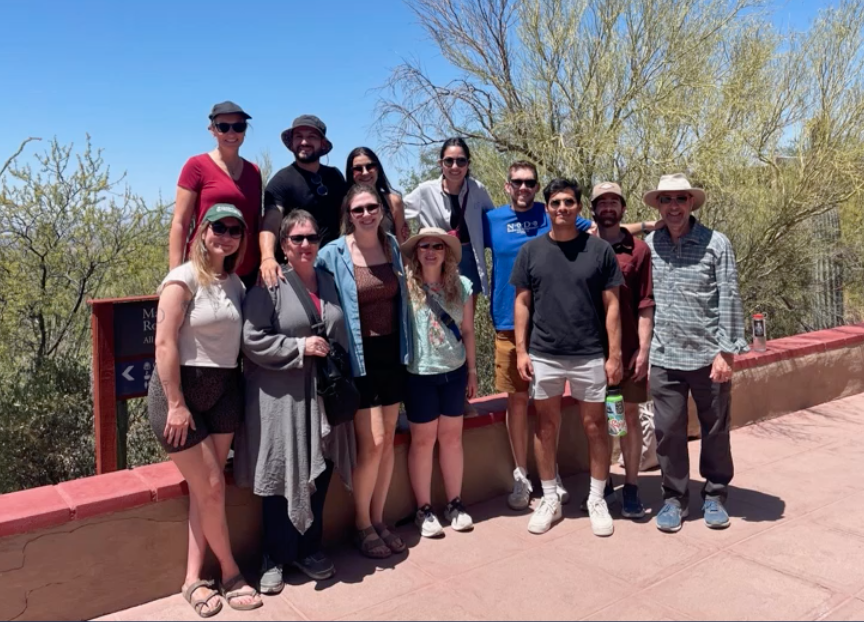
This was the program’s first year, after a successful 2022 pilot led by Moira Rogers, PhD, the former assistant director of OGHE, Evan Ashkin, MD, (Family Medicine), and Laura Villa Torres, PhD, MSPH, who teaches a prerequisite course through the Gillings School of Global Public Health.
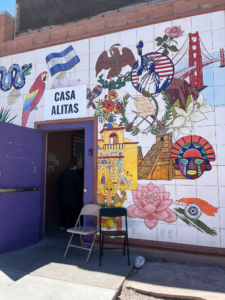 In June, students were hosted by Casa Alitas, a non-profit that serves migrant families who have left their home countries to escape violence and poverty by providing hospitality and humanitarian aid, medical services, short-term shelter, and help reuniting with family members. Anysa Fernandez (MS2) helped with many shelter tasks, from migrant intake to helping women access clothing, and other needed items, while waiting to be placed.
In June, students were hosted by Casa Alitas, a non-profit that serves migrant families who have left their home countries to escape violence and poverty by providing hospitality and humanitarian aid, medical services, short-term shelter, and help reuniting with family members. Anysa Fernandez (MS2) helped with many shelter tasks, from migrant intake to helping women access clothing, and other needed items, while waiting to be placed.
“When migrants arrive, one of the struggles is not only communication, but also finding internet access for booking flights or trains to reach their destinations,” explained Fernandez. “When you do not have a phone or you do not have Internet access, or you do not have a U.S. currency or a credit card that works, it is difficult, in addition to the language barriers. This was something we enjoyed doing for the migrants.”
“Something we did not think about is the fact that running water is not necessarily a commodity for many migrants, so we needed to make sure they realized that our tap water was clean and safe to drink. Dr. Ashkin’s daughter (Amelia Ashkin-Baker) made signs in multiples language to introduce aspects of the shelter to migrants.”
MSHL also introduced students to new experiences through Humane Borders and the Tucson Samaritans, where they made trips to the border for water drops, leaving large containers of water marked by big flags. Eduardo Santana-Bueno (MS2) explained.
“A lot of migrants, unfortunately, die of dehydration crossing the border, and it’s a powerful image to see it and understand what it represents. We were at a site where a cross signified where a person had passed away. The person died from dehydration.”
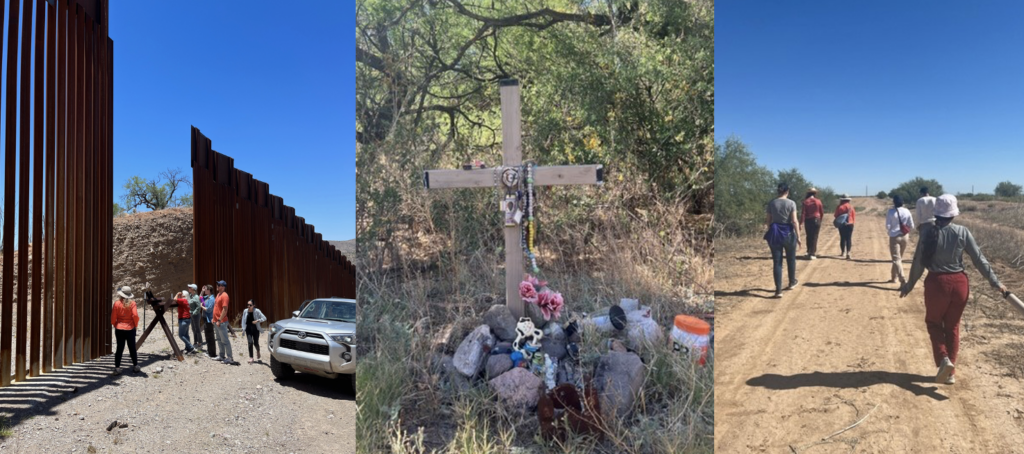
“We learned about the migrant experience and its effects on the health of current and future patients by talking to individuals, and hearing heartbreaking stories about how they got there. One individual had left his home country eight months ago, but still was not guaranteed asylum.”
Fernandez explained migrants arrive at the border from all over the world. “While we were there, we had a surge of migrants coming from Mauritania, and it was challenging to navigate these conversations using Google Translate.”
Bolivia: Reproductive and Sexual Health
The Bolivia: Reproductive and Sexual Health Program was also implemented this year after a pilot led by Rogers last summer. It was through a campus invitation from Raúl Necochea López, PhD, MSc, during the pandemic, that Rogers learned about CIES, a nonprofit organization that came to UNC to talk about defending reproductive and sexual rights, and access to comprehensive health services. Rogers traveled to Bolivia to learn about the organization, and one highlight was seeing how CIES ensures that every clinic has a psychologist, or someone interested in social issues, who can help young people feel welcome to have the conversations that will guide them toward the best health care for their needs. Rodgers also helped to introduce an opportunity for students to study Spanish intensively, through Latino Schools, before starting with CIES.
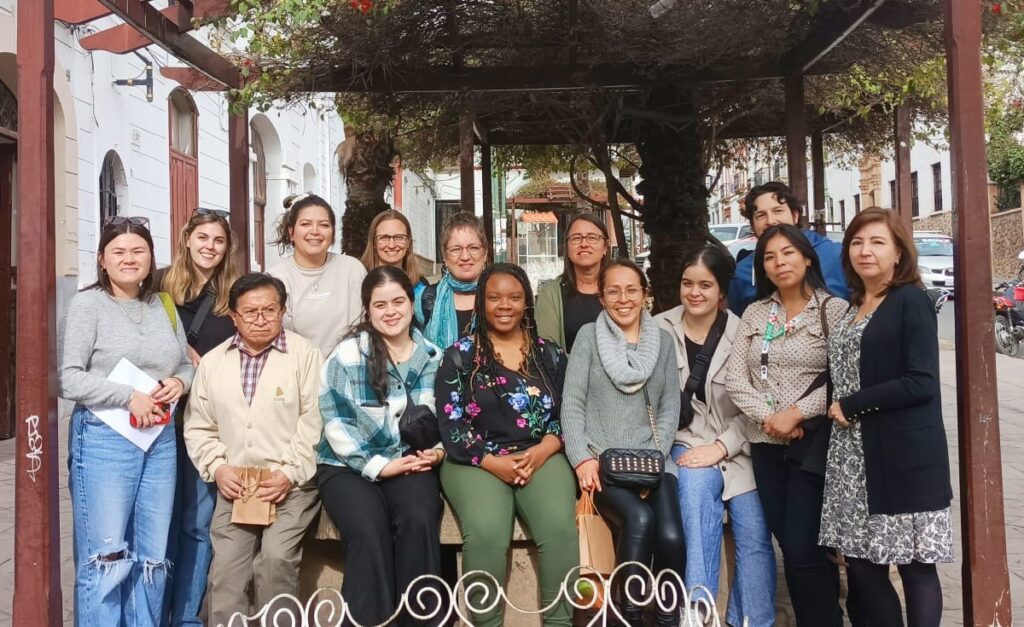
“I was particularly proud that most of the students in the pilot took away new learnings that they want to integrate into their own medical careers, to bring change to some of the patterns of young teenage pregnancy and sexuality in the U.S.,” Rogers said. “They learned from the Bolivian people, and that’s always the goal, but we usually think about Americans going in to teach. In this case, there was a shift in the perspective.”
This program, open to MD and GSGPH students as well as UNC resident physicians, introduced learners to several communities in Bolivia last summer where post-covid challenges continue to impact the sexual and reproductive rights of adolescents and young people.
“Teen pregnancies have a higher rate of maternal mortality and are more likely to lead to teens dropping out of school,” explained Sylvia Becker-Dreps, MD, OGHE Director who traveled to Bolivia with students. “Fortunately, CIES fills an important need for reproductive and sexual health care as Bolivia has the highest teen pregnancy rate in the region.”
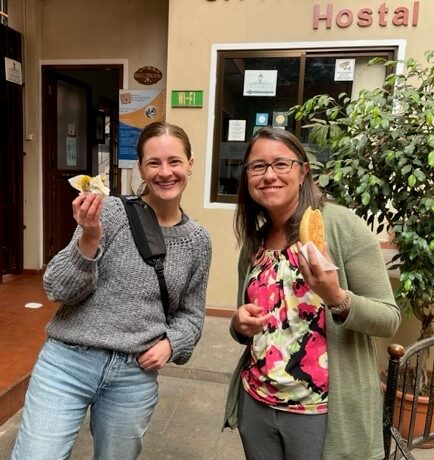 Cordelia (Coco) Muir (MS2), pursuing obstetrics and gynecology, who participates in Medical Students for Choice, worked at a Santa Cruz Hospital.
Cordelia (Coco) Muir (MS2), pursuing obstetrics and gynecology, who participates in Medical Students for Choice, worked at a Santa Cruz Hospital.
“Many might think of South America as not being able to provide the best health care, but going into these hospitals showed us that the United States is a more dangerous place to get this kind of health care. In Bolivia, they provide much more comprehensive care, and this was beneficial to see, and something to aspire to as I progress in medicine.”
Christina Cobos (MS2) shared her experience with CIES in a recent presentation.
“I like to describe this program as Planned Parenthood made into a full-sized hospital, throughout Bolivia, along with sexual health education for all of Bolivia’s public schools. We were able to shadow people in clinic, but we also did educational outreach, working with groups of young people who go out to schools to do sexual health education.”
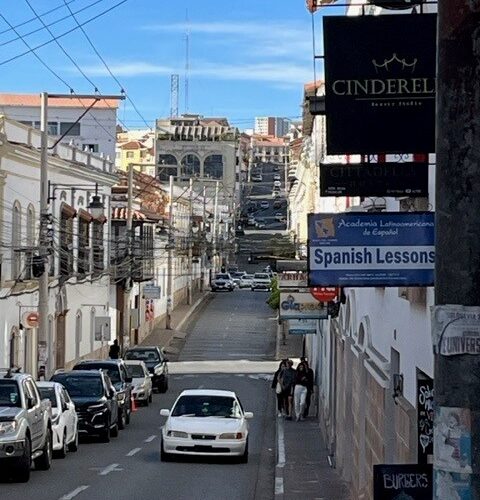 “I was able to observe specific patient care within a health care system that’s very different from the U.S.,” said Joshua Lopez (MS2), and it worked very well.
“I was able to observe specific patient care within a health care system that’s very different from the U.S.,” said Joshua Lopez (MS2), and it worked very well.
The experience also included orientations in the Bolivia city Sucre, with a Spanish language program tailored to meet the needs of each student.
“Today’s medical students see the value in becoming fluent in Spanish for their future roles as physicians,” said Becker-Dreps. “That is partly why this new elective is so popular.”
Megan Artis (MS2) arrived in Bolivia with a beginner level knowledge of the language. “I stayed in Sucre where there is little to no English spoken, but during this time I participated in the language program which greatly improved my speaking ability.”
Heidi White, MIS, OGHE’s new assistant director, with Sylvia Becker-Dreps, MD, MPH, the director, are focused on growing the OGHE learning infrastructure that supported 33 UNC students on global health electives in summer 2023. The Office of Global Health Education is part of the Institute for Global Health and Infectious Diseases. The UNC School of Medicine provides funding support for many of its programs.
